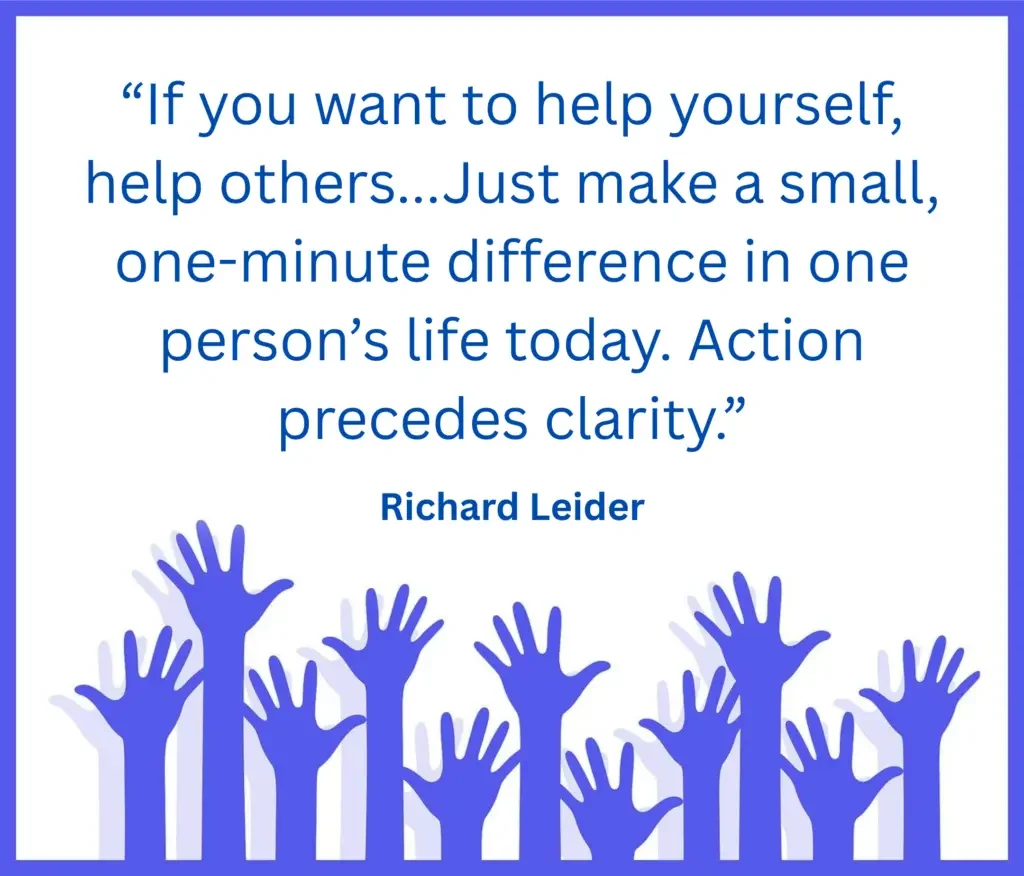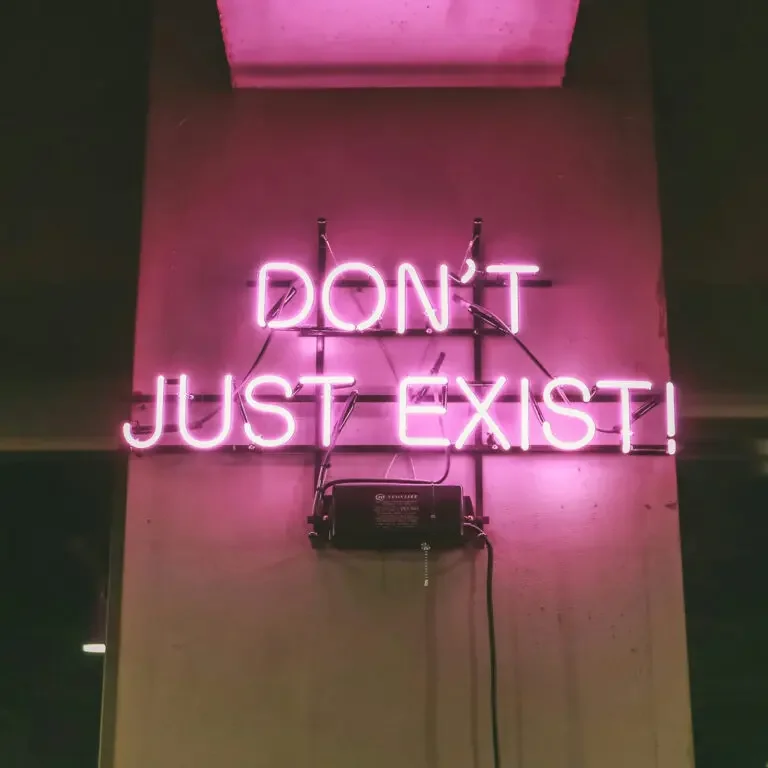How to Combat Purpose Anxiety
by Richard Leider
“There’s a crack, a crack in everything. That’s how the light gets in.”
There’s a crack in many of our lives today. It’s a feeling of purpose anxiety—the fear of not knowing our purpose in life.
Purpose anxiety comes at times from the feeling that “I’m just not enough!” It can be ignited by family and societal expectations, social media comparisons with others, and by mortality—the feeling that there is not enough time to do the important things. Chances are you have experienced it at least once in your life.
The quote above from Leonard Cohen’s song, “Anthem,” is a powerful message about finding the light in dark times. It suggests that while everything has imperfections and flaws, those imperfections are what allow for light to shine through.
Purpose anxiety was first defined by Larissa Rainey in her research entitled “The Search for Purpose in Life: An Exploration of Purpose, the Search Process, and Purpose Anxiety.” She found that roughly 91% of people experience at least some purpose anxiety at some age or stage of life, and it “significantly hampers well-being.”
The importance of living a meaningful life has been the subject of many a philosopher, artist, writer, and spiritual leader. Joseph Campbell said, “Follow your bliss.” Pablo Picasso said, “The meaning of life is to find your gift. The purpose of life is to give it away.”
Dr. Vivek Murthy, most recently the U.S. Surgeon General, shared his “Triad for Fulfillment”—an antidote for loneliness and purpose anxiety. The “Triad” refers to three essential elements that lead to a meaningful life: relationships, service, and purpose:
• Relationships: Building and maintaining meaningful connections with others including family, friends, colleagues, and community members providing a feeling of belonging.
• Service: Engaging in small acts of kindness and connection, volunteering or contributing to something larger than yourself that aligns with your values.
• Purpose: Finding a “reason to rise” through a simple sense of daily contribution; unlocking your gifts and giving them away.
This sounds great in theory, but how can we overcome the anxiety of not knowing our purpose in life?
Overcoming purpose anxiety
The “crack in everything,” has me turning to Viktor Frankl’s seminal book, “Man’s Search for Meaning.” At the time of Frankl’s death in 1997, at the age of 93, the book had sold over 10 million copies in 24 languages.
I met Frankl in 1968 at his workshop in San Diego. Learning about how he survived his tragic experiences in Nazi concentration camps during World War II was a fortuitous encounter for me. I learned that our search for meaning is a primary motivation in life and that this meaning is unique and specific to each of us.
I learned that, deep down, we are all hardwired humans seeking a life and a livelihood that has purpose and meaning—that through “letting the light get in,” we are capable of enduring even the worst atrocities. As Frankl wrote, “the last of the human freedoms—to choose one’s attitude in any given set of circumstances, to choose one’s own way.”
Frankl shared that his purpose in life was to “help others find theirs.” His purpose ultimately became the inspiration for my purpose: to “help others grow and give for life.”
My purpose became my reason for creating Inventure—The Purpose Company, where I learned over and over that none of us escapes the “cracks in everything.” The trouble, I observed, is that we don’t often know how to “let the light in.” We cover over and patch up the places that are cracked and move on as though they don’t exist.
The “crack in everything” has many of us, today, asking life’s most vital, yet deeply uncomfortable question: “What is my why?”
We yearn for a sense of “why” but aren’t sure what it is or we don’t know how to find it or live it. We wrestle with purpose anxiety at one point or another in our lives. It is often triggered by life transitions like retirement, serious illness, divorce or breakup, or the end of a role or a new chapter in life. It can come from simply feeling stuck in life.
Many of my coaching clients came to me with lives that looked great on the outside—successful careers, financial stability, decent relationships, good health, and yet, deep down inside something felt like it was missing. They often admitted to a nagging sense of guilt about wanting something more meaningful in their lives.
If any of this sounds like you, know that you’re not alone and that the benefits of a search for purpose and meaning far outweigh the effort to find it. It must be “unlocked” (not found), meaning you may need to put in some work to unlock it.
Three practices for “letting the light get in”:
1. Purpose comes from listening
Isolation is fatal. Don’t go it alone! First, pick a purpose partner—a “committed listener”—someone you trust to have a deep conversation with. Discuss what activities might help the light get in. What will make you come alive and feel energized? And what activities drain your energy and might need to end? Imperfection is inevitable; nothing is perfect. Everything has cracks, flaws, or imperfections in some way. Our flaws can reveal hidden strengths, opportunities for growing and giving. Next, pick a “purpose exemplar.” Look around for “purpose exemplars”—people who represent models of meaning in service to something beyond themselves. When possible, interview them to gain insight from their life choices.
2. Purpose comes from exploring and experimenting
Give up comparison. Focus on “doing different.” The power of purpose comes from living your own version of an authentic life. You can’t overcome purpose anxiety by sitting on the couch and mulling it over. Life is a process of elimination. We need to act and try things to see what sticks, what works, and what doesn’t. Shut down the inner critic that’s telling you that you have to do it right. Focus on “doing different” by taking small, acceptable risks. Purpose requires exploring and experimenting without comparison.
3. Purpose comes from focusing on the “little p” purpose
Purpose is a verb. Little “p” purpose turns into big “P” purpose over time. You’ve probably heard this a million times: If you want to help yourself, help others. This works because it gets you out of your head and your narrow life and into the lives of others. You can let the light get in and feel more alive by helping others. My hope is that you might find “little p” purpose in the small and intentional choices that fill the 1,440 minutes in your day. Just make a small one-minute difference in one person’s life today. Action precedes clarity.
Author, coach, and speaker Richard Leider, is the founder of Inventure – The Purpose Company and author of 10 books, including three bestsellers that have sold over 1 million copies.



